Sandra Beasley's Blog, page 5
March 1, 2018
Multitudes
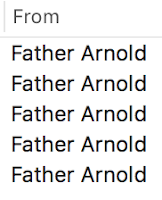 Readers may have picked up on this before, but my inbox is my to-do list. I rarely have more that twelve emails in it at a time because, yes, I avoid the unlucky thirteen. If I agree to do something for you (or with you) that requires two or three to-do simultaneous emails, I get cagey really fast because you're probably pushing me over my inbox limit.
Readers may have picked up on this before, but my inbox is my to-do list. I rarely have more that twelve emails in it at a time because, yes, I avoid the unlucky thirteen. If I agree to do something for you (or with you) that requires two or three to-do simultaneous emails, I get cagey really fast because you're probably pushing me over my inbox limit. Occasionally an email crosses over from being a "to-do" to being a "ghost." A haunting. Every day I see it, and every day I wonder why I haven't responded to it yet. Typically there is just the one.
Up until December of 2017, my ghost email had the subject line "My mother died, I am writing poems," and the email dated back to July 2015.
What type of jerk doesn't reply to that email, I ask you? Or rather, I asked myself. At least once a week. For a year and a half.
Then I'm in a meeting, and a colleague mentions she has been in ongoing correspondence with the author of this email. Who happens to be a famous and influential author, someone you admire greatly. Everyone gushes.
What type of idiot doesn't reply to that email, I ask you? Or rather, I asked myself.
The first time we met, we didn't meet. He give the opening remarks at a ceremony where I later got...third place. He had to rush out to catch a plane before the results were mentioned, so he probably doesn't know I'm a bronze talent and nothing more.
The second time we met, it was after a friend emailed to say he'd featured a sestina of mine on his website. I was delighted to introduce myself at the tail-end of an AWP panel and hear him say to others. "She's a great poet!" This will be a highlight of my conference. Later, in an email, he will admit he was stoned on Valium at that point due to a pre-existing injury.
I am trying to figure out why I spent hours, hours, reading and re-reading the concerns about Sherman Alexie this past week. Why I feel so soul-hollowed. Why I picked a fight with my husband last night (this probably isn't Alexie's fault; it has been a crap week).
In revisiting this email, I re-read emails we'd exchanged. Mostly his one-liners proportioned to my nervous, highly edited three paragraphs. How are the poems coming? Once, a snapshot of a stanza of mine and the comment that I'd "murdered" him. Once, the challenge regarding my photo: "You look way too happy. Need more suffering poet." (That was funny. I laughed.) Me, joking in return, sometimes with an edge, but never too explicit; that's how these games are played.
Because I'm searching for his name, another email comes up: the request to reprint my comments on one of his poems in an anthology. I say Yes, because I am a huge fan. For the single most difficult course of my MFA education, I wrote a final exam annotating "The Business of Fancydancing." I got an A in that class.
I finish this dive into the archives and I'm a little confused. When prompted with his poem, and actually his two elegies--an email one day, then another the next--why did I freeze up? Why didn't I just send him a damn poem in return? Why didn't I at least send condolences?
There is something you aren't finding, I think. I do the deeper dive, and that's when they come up, emails from the first email address in 2012 before the two other email addresses (his account has been compromised, he explains), the ones from Father Arnold. "You are an awesome poet. This is a very short fan letter," he says. It seems true! Maybe it is true. He pays attention to my work line by line.
The new draft he shares is ostensibly about spectacles, pictured as bare legs intertwined in a bed. The second "quick poem" he shares is a couplet about adult love. His phrase. He says he's working with his shrink to understand the concept. Because I am fancy-dancing, I send a text in return--a poem already written, one about my future husband--and he replies gracefully. Then he goes silent for a while.
When the surfaced with poems about loss, I couldn't reply. Because on some level I wondered if this was a kind of grooming. Because I knew that no matter how ably I rose to the challenge, at first, sooner or later I'd give something away that I did not want to give. Because I'd be trying to impress him. Because I am a huge fan.
Sometimes the cloak is praise.
Sometimes the cloak is humor.
Sometimes the cloak is grief.
Sometimes the person doesn't even realize he (not always a he) is cloaking intent.
Sometimes (s)he/they doesn't realize what the intent will turn out to be. Sometimes a person is genuine, and yet a charmer, and an abuser, and yet a survivor of abuse, and a valuable poet, and yet an oppressor of poets, all in one. We contain multitudes.
I hope people step forward with their stories, if the right choice for them, because it can be unburdening to be heard by your community. We are listening, we are here. We cannot allow the mourning of those who have "failed" us, who have lost our good faith, to obscure what was really lost: the words of talents who felt violated, suppressed, and threatened by the energy of someone more powerful than them.
My story is not a trauma narrative. I am not claiming that space. This is just what I happen to have to say.
Published on March 01, 2018 16:23
February 14, 2018
Evolution of a Valentine
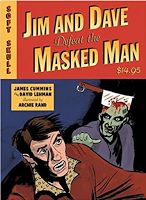 Today, a student walked into my office at Wichita State University and wanted to talk about sestinas. Yes, please! We got to this place from her interest in poems that channeled crime, noir, and sustained narrative, which had led me to suggest Jim and Dave Defeat the Masked Man, by David Lehman and James Cummins.
Today, a student walked into my office at Wichita State University and wanted to talk about sestinas. Yes, please! We got to this place from her interest in poems that channeled crime, noir, and sustained narrative, which had led me to suggest Jim and Dave Defeat the Masked Man, by David Lehman and James Cummins.The sestina was a new form to her. She had looked up the basics of the history and patterning of end words. From there, we talked about organic modes to which the sestina might lend itself--poems of fixation, of worrying--and looked at a few favorite examples.
Since she seemed a bit nervous about the process, I offered to show her some drafting notes from way back when. I first scanned these to appear in Issue Two of Pelorus Press , a nifty resource for anyone interested in tracking the art of literary editing.
First, scribblings during a long road trip to visit Sarah Lawrence. (The future founding editors of Pelorus were in that class, which belonged to Jeffrey McDaniel.)
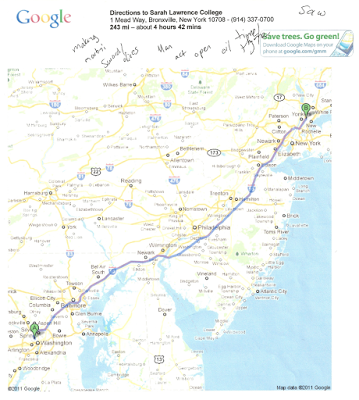
I was reaching for words with some syntactical flexibility--"saw," for example, or "time" / "thyme"--but otherwise I wasn't committed to an idea. At some point I flipped the page over and tried to distill my options.
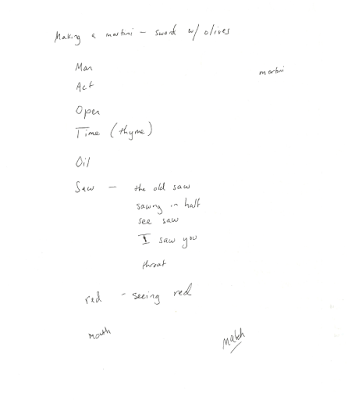 Out of this play, one image had arisen: a martini with one of those inexpensive cocktail swords. Did that mean this poem would be set in a bar? Not necessarily, but I was in the setting of a bar when I picked up my drafting a few hours later.
Out of this play, one image had arisen: a martini with one of those inexpensive cocktail swords. Did that mean this poem would be set in a bar? Not necessarily, but I was in the setting of a bar when I picked up my drafting a few hours later.
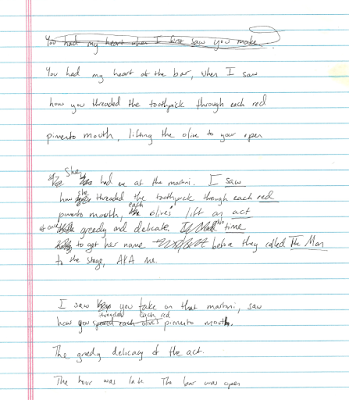 Always a little painful for me to read through the roughest of rough drafts, since many of the phrasings veer toward emotional and placeholder language ("AKA me"). But at least the wheels are turning. In particular, I was weighing whether the speaker would directly address the object of his desire. I had realized that if I wanted to use "act," the speaker needed to have an actual act of some kind.
Always a little painful for me to read through the roughest of rough drafts, since many of the phrasings veer toward emotional and placeholder language ("AKA me"). But at least the wheels are turning. In particular, I was weighing whether the speaker would directly address the object of his desire. I had realized that if I wanted to use "act," the speaker needed to have an actual act of some kind.
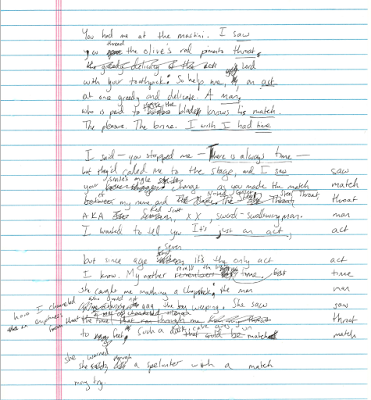 For me, the litmus test is those first two stanzas. If I can place the end words first voluntarily, then as directed by the form--if I justify the reflexive moment, transitioning between stanzas 1 and 2--I get excited. Here a conversational mode facilitates the required echo of "time." I still haven't figured out the central conflict: yes, his job might be a deterrent to dates. Yes, there might be humor in tracking how a child trains to become a sword-swallower. But what's the real-time risk going to be?
For me, the litmus test is those first two stanzas. If I can place the end words first voluntarily, then as directed by the form--if I justify the reflexive moment, transitioning between stanzas 1 and 2--I get excited. Here a conversational mode facilitates the required echo of "time." I still haven't figured out the central conflict: yes, his job might be a deterrent to dates. Yes, there might be humor in tracking how a child trains to become a sword-swallower. But what's the real-time risk going to be?
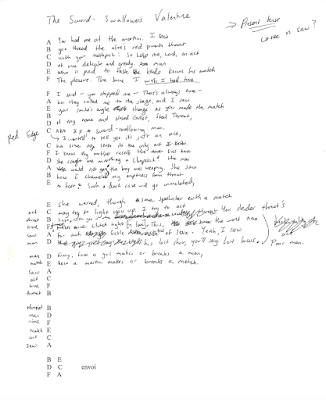 I've moved from lined notepad to trusty template--a document that lives on my desktop for when I'm playing with the scaffolding of this form. The child's prop has changed from chopstick to butter-knife. Although committed to POV, I'm still trying to decide tense. The toughest part of the sestina looms, stanzas 4/5. This is where you have to change it up; the sestina is a marathon, not a sprint.
I've moved from lined notepad to trusty template--a document that lives on my desktop for when I'm playing with the scaffolding of this form. The child's prop has changed from chopstick to butter-knife. Although committed to POV, I'm still trying to decide tense. The toughest part of the sestina looms, stanzas 4/5. This is where you have to change it up; the sestina is a marathon, not a sprint.
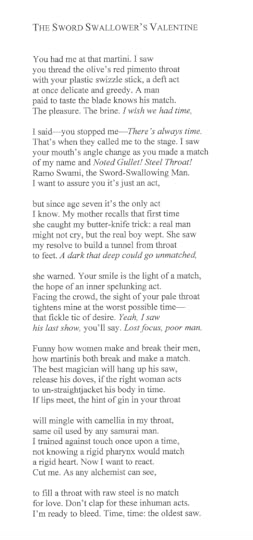 After a lifetime of avoiding bloodshed, the speaker now craves this sign of vulnerability that is embedded in love. Stanza 5 re-harnesses the power of endstops. That elusive "oil," which proved unwieldy as an endword, gets a chance to appear. (Only after I spend an afternoon researching the art of sword-swallowing, and discover that the camellia oil on the blade is borrowed from samurais.) "Saw," the first word I scribbled before this was even sure it could be a poem, is also where I get to land. I've probably read the poem aloud twenty of thirty times at this point, as part of the revision process.
After a lifetime of avoiding bloodshed, the speaker now craves this sign of vulnerability that is embedded in love. Stanza 5 re-harnesses the power of endstops. That elusive "oil," which proved unwieldy as an endword, gets a chance to appear. (Only after I spend an afternoon researching the art of sword-swallowing, and discover that the camellia oil on the blade is borrowed from samurais.) "Saw," the first word I scribbled before this was even sure it could be a poem, is also where I get to land. I've probably read the poem aloud twenty of thirty times at this point, as part of the revision process. What interests me about the form is the push-pull between the control you have (choosing end words) and the control you surrender (the narrative spun out by those end words). This poem is one of six sestinas that appears in Count the Waves. I ultimately obscure the stanza breaks, because I want it to read like a dramatic monologue. That version can be found here. I'm glad to look back and be reminded of how I found my way from draft to draft. I'm grateful that a poet walked out of my office ready to tackle her own sestina. Though I am 1,253 miles away from my husband, that's all the valentine I need.
Published on February 14, 2018 13:51
February 4, 2018
Traveling
I woke up at 3:41 AM and haven't been able to fall back asleep. And I'm thrilled about that. Because I woke up from a dream of writing, and that means writing is nigh.
My creative instincts go dormant in times of high stress. So do my social media instincts; I drop off of Facebook and Twitter and, evidently, this blog. That's a good survival tactic--I focus on my to-do list, and steer around antic or angry one-line postings--except I feel guilty about the isolation, anxious I've misplaced myself. In the past two weeks, I moved and then I moved again. I stayed up until 2 AM unpacking the last of cardboard boxes in our new apartment and, after a few hours' sleep, packed my suitcases and made the 20-hour trip to Wichita State University for February. The bed & breakfast where I'm staying has an in-house kitty, a Russian Blue who stares at me dolefully and merely tolerates my petting. I miss the polydactyl tortie who leaps up on my pillow and gently extends a paw to tap me on the forehead.
Travel has been the catalyst of my 30s. I have to laugh when I remember missing a dear friend's wedding, back in my 20s, because at the time I couldn't fathom driving to Nashville alone. Travel has offered me the chance to see incredible things, and to clarify what I can do with my life. But at times it is lonely, especially when getting to know the prairie winds and 4 AM trains of Kansas.
A couple of nights before I left home, I hosted a poetry dinner at the Arts Club of Washington. I've been doing these for a while now, as a perk for the members. Each salon is a chance to read and discuss poems, curated to theme, over a three-course meal. The theme this time was "Travel," and here are the texts I used:
"Travel" by Robert Louis Stevenson"Arrival at Santos" by Elizabeth Bishop"The Sweet Hurried Trip Under and Overcast Sky: Urban Renewal, xxvii" by Major Jackson"Return to Florence" by Cyrus Cassells"Report Back: Torino in April" by Sarah Browning (from her new collection, Killing Summer )"Riding Alone for Thousands of Miles" by Sally Wen Mao"Looking for the Gulf Motel" by Richard Blanco"Quisiera Declarar" by Erika Meitner
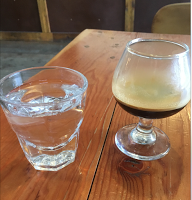 So what sparked a creative wake-up call this particular night? After a pressured first week of meeting students and eating dinners of boxed soup, I finally took a day to explore Wichita. Nothing too ambitious, but I ventured out to get Kālua pork with fresh white rice and a side of Lomi-Lomi salmon at Noble House, a Hawaiian lunch plate spot as good as any I've had in Kauai. I suspect it was Chef Akamu Noble himself working the register. Upon hearing I was a poet from D.C., he recommended I visit Reverie Roasters up the street, where I got a "boneshaker" espresso (I'm a pushover for espresso with a side of fizzy water). Then, just for the excuse to stay, I drank another two cups of batch brew coffee. Cue the 3:41 AM wake-up. I did a few hours of drafting on comments for forthcoming poetry anthologies, so that's two items off my to-do list. But what mattered most was being surrounded by the hum of other people living and working. The funny thing about traveling far from home is that my goal, once I'm here, is always simply to make myself feel...at home. Now I just gotta befriend the cat.
So what sparked a creative wake-up call this particular night? After a pressured first week of meeting students and eating dinners of boxed soup, I finally took a day to explore Wichita. Nothing too ambitious, but I ventured out to get Kālua pork with fresh white rice and a side of Lomi-Lomi salmon at Noble House, a Hawaiian lunch plate spot as good as any I've had in Kauai. I suspect it was Chef Akamu Noble himself working the register. Upon hearing I was a poet from D.C., he recommended I visit Reverie Roasters up the street, where I got a "boneshaker" espresso (I'm a pushover for espresso with a side of fizzy water). Then, just for the excuse to stay, I drank another two cups of batch brew coffee. Cue the 3:41 AM wake-up. I did a few hours of drafting on comments for forthcoming poetry anthologies, so that's two items off my to-do list. But what mattered most was being surrounded by the hum of other people living and working. The funny thing about traveling far from home is that my goal, once I'm here, is always simply to make myself feel...at home. Now I just gotta befriend the cat.
My creative instincts go dormant in times of high stress. So do my social media instincts; I drop off of Facebook and Twitter and, evidently, this blog. That's a good survival tactic--I focus on my to-do list, and steer around antic or angry one-line postings--except I feel guilty about the isolation, anxious I've misplaced myself. In the past two weeks, I moved and then I moved again. I stayed up until 2 AM unpacking the last of cardboard boxes in our new apartment and, after a few hours' sleep, packed my suitcases and made the 20-hour trip to Wichita State University for February. The bed & breakfast where I'm staying has an in-house kitty, a Russian Blue who stares at me dolefully and merely tolerates my petting. I miss the polydactyl tortie who leaps up on my pillow and gently extends a paw to tap me on the forehead.
Travel has been the catalyst of my 30s. I have to laugh when I remember missing a dear friend's wedding, back in my 20s, because at the time I couldn't fathom driving to Nashville alone. Travel has offered me the chance to see incredible things, and to clarify what I can do with my life. But at times it is lonely, especially when getting to know the prairie winds and 4 AM trains of Kansas.
A couple of nights before I left home, I hosted a poetry dinner at the Arts Club of Washington. I've been doing these for a while now, as a perk for the members. Each salon is a chance to read and discuss poems, curated to theme, over a three-course meal. The theme this time was "Travel," and here are the texts I used:
"Travel" by Robert Louis Stevenson"Arrival at Santos" by Elizabeth Bishop"The Sweet Hurried Trip Under and Overcast Sky: Urban Renewal, xxvii" by Major Jackson"Return to Florence" by Cyrus Cassells"Report Back: Torino in April" by Sarah Browning (from her new collection, Killing Summer )"Riding Alone for Thousands of Miles" by Sally Wen Mao"Looking for the Gulf Motel" by Richard Blanco"Quisiera Declarar" by Erika Meitner
 So what sparked a creative wake-up call this particular night? After a pressured first week of meeting students and eating dinners of boxed soup, I finally took a day to explore Wichita. Nothing too ambitious, but I ventured out to get Kālua pork with fresh white rice and a side of Lomi-Lomi salmon at Noble House, a Hawaiian lunch plate spot as good as any I've had in Kauai. I suspect it was Chef Akamu Noble himself working the register. Upon hearing I was a poet from D.C., he recommended I visit Reverie Roasters up the street, where I got a "boneshaker" espresso (I'm a pushover for espresso with a side of fizzy water). Then, just for the excuse to stay, I drank another two cups of batch brew coffee. Cue the 3:41 AM wake-up. I did a few hours of drafting on comments for forthcoming poetry anthologies, so that's two items off my to-do list. But what mattered most was being surrounded by the hum of other people living and working. The funny thing about traveling far from home is that my goal, once I'm here, is always simply to make myself feel...at home. Now I just gotta befriend the cat.
So what sparked a creative wake-up call this particular night? After a pressured first week of meeting students and eating dinners of boxed soup, I finally took a day to explore Wichita. Nothing too ambitious, but I ventured out to get Kālua pork with fresh white rice and a side of Lomi-Lomi salmon at Noble House, a Hawaiian lunch plate spot as good as any I've had in Kauai. I suspect it was Chef Akamu Noble himself working the register. Upon hearing I was a poet from D.C., he recommended I visit Reverie Roasters up the street, where I got a "boneshaker" espresso (I'm a pushover for espresso with a side of fizzy water). Then, just for the excuse to stay, I drank another two cups of batch brew coffee. Cue the 3:41 AM wake-up. I did a few hours of drafting on comments for forthcoming poetry anthologies, so that's two items off my to-do list. But what mattered most was being surrounded by the hum of other people living and working. The funny thing about traveling far from home is that my goal, once I'm here, is always simply to make myself feel...at home. Now I just gotta befriend the cat.
Published on February 04, 2018 04:57
January 13, 2018
My Life in Boxes
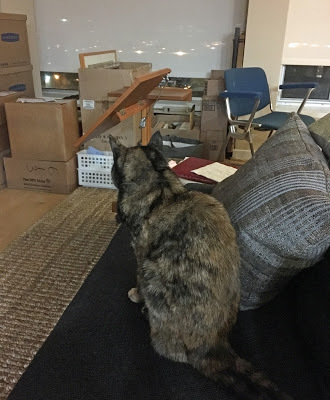
This is my apartment, or rather, this is the remains of an apartment being readied for a move. I flew home from teaching in Tampa today. The truck arrives on Wednesday. I leave for a monthlong stint at Wichita State University next week. I have a knack for stacking major life events, one on top of the other.
We're not leaving DC, or Southwest; we're moving just a few blocks away. Why? Because the new apartment has a second bedroom, which makes for a writing office. Making this leap has been a struggle , since a two-artist household doesn't satisfy the conventions of many housing opportunities in a bigger city. But sometimes you have to take the leap, even when it is over a great big canyon.
I have loved this apartment, but I'm ready to prioritize what I can so with with a room of my own. There is no gate, no lock, no bolt that you can set upon the freedom of my mind. So, you see that little teak desk in the photo above? That blue chair? They are going to go here, in the photo below. The best part is that I think I can eke out enough room in this office for a futon that would allow me to offer visiting poets a place to crash, as long as you don't mind waking up surrounded by books.
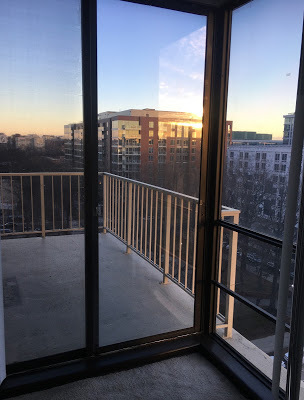
Published on January 13, 2018 19:57
January 7, 2018
Introductions
Presenting the introduction at the start of a reading is one of my favorite ways we get to celebrate fellow writers--especially when the audience is the
University of Tampa MFA program
, gathered for their annual January or June residency, and I'm able to share a poet whose work means a lot to me. Yesterday,
Ada Limón
joined us for a triumphant lecture and reading.
Since Ada is someone who I got to know in part through this space--the blog scene, and the poets associated with it in the mid-2000s--it feels appropriate to share what I said. Plus, the art of the introduction is something that interest me; how do we weave in personal anecdote while making sure to provide the important tenets of biography? How do you prime the audience for what to hear (or not)?
In my MFA program, Richard McCann was (is) legendary for the quality of his introductions. The first thing the author usually said was, "Let's just stop there."
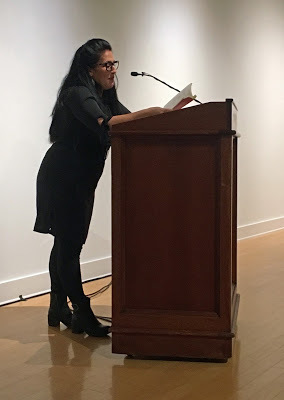
Here's what I said, minus a few ad-libs:
Those of you who have studied poetry with me know that I am a fierce defender of the distance between poet and speaker. So it’s mildly heretical that I’m about to talk about the author off the page, rather than on it. Indulge me.
Ada Limón and I were part of a cohort of poets who came up at about the same time in publishing our first books. Now, I say that word "cohort" with two asterisks. The first asterisk is that we were a cohort uniquely born of the internet era. Yes, we each had the communities created by school—which in her case, was a rock-star class of New York University MFA graduates. But in the larger sense, we were that first virtual community of poets who had a meaningful dialogue via comments left on each others’ blogs. We muddled our way through NaPoWriMo together. We cheered each other on when no one else was paying attention. The second asterisk is that Ada’s first book and her second book were simultaneous, thanks to having Jean Valentine select the manuscript Lucky Wreck for the 2005 Autumn House Poetry Prize, and then—literally, within months—winning the 2006 Pearl Poetry Prize with The Big Fake World. That never happens. She made it happen.
[Note that the audience jumped into spontaneous applause here! She had a lot of fans in the crowd, some of whom had only encountered her for the first time at the afternoon craft seminar.]
One of my first trips to New York City, in November 2007, was to read alongside Ada at Chelsea’s ACA Gallery for Big Game Books , a micro press Three years later, I crowded into NYU’s Lillian Vernon House to hear her read with Jason Schneiderman and Jen Knox. I’m pretty sure I told each poet that I was friends with one of the other poets, to hide that I was just a big huge fan and I didn’t really know a soul in the room. There, she electrified the crowd with these lines from the title poem of her third collection, Sharks in the Rivers, which plays with a speaker’s efforts to overcome phobia:
Through another doorway, I walk to the East River saying, Sharks are people too. Sharks are people too. Sharks are people too. I write all the things I need on the bottom of my tennis shoes. I say, Let’s walk together. The sun behind me is like a fire. Tiny flames in the river’s ripples. I say something to God, but he’s not a living thing, so I say it to the river, I say, I want to walk through this doorway But without all those ghosts on the edge, I want them to stay here. I want them to go on without me. I want them to burn in the water.
Since then we’ve done a conference together in Texas, a panel together in Massachusetts, had some frank talks about the publishing world, and grabbed that fast hug at countless AWP Conferences. I’ve watched her move to Kentucky and have a book named “Top Ten” by the New York Times. So when I say you’re in for a great reading, that’s based on a decade’s worth of witness. The downside of having an introducer who follows your work for a decade is that she can dig up old interview answers like this one, from The Scrambler circa 2007:
[Note that at this point Ada curled up in her chair like one of those roly-poly bugs.]
Question: Where do you see yourself in 10 years?
Answer: (and here, I’ll excerpt) In ten years I'll be living in my hometown of Sonoma, in a small house with a big garden….I'll probably be married or living with an aging rock star or some organic farmer who is single handedly trying to bring back the bee. I'll write more poetry, some fiction, an album, and a screenplay. I'll go to Salmon Creek and build bonfires. I'll be remembering everything in case anyone forgets.
I started off by giving myself permission to get away from the page, but now I return to it. What I appreciate about Ada Limón’s work is not pyrotechnics of form, but the ember of a closely held truth. Although I know that one of her formative mentors is Philip Levine, I actually think of another Philip, Philip Schultz, and his great big heart.
The poet and the speaker are not one and the same. But I suspect that the poems you’ll hear tonight—drawing on both Bright Dead Things, a 2015 finalist for both the National Book Award and the National Book Critics Circle Awards in Poetry, and her forthcoming collection The Carrying—will grapple with realities common to us all:
Like sharks, to survive we move forward to live. To move forward, we name goal-dreams and dream-goals. To move forward from there, we must admit: What was gained? What was lost? How is that loss manifested in the natural world? How do we make good of mourning? How do we reconcile our past and future selves? We embrace being present. Yet we dream again. We dream big. Without further ado, and with much pleasure, I present Ada Limón.
#
I played only a minor role, of course. What followed--six poems from the most recent book, six poems from the forthcoming one, a few jokes, and great prefacing comments that invited the audience to engage with the work--that's where the magic happened. But I'm so glad I could help set the stage for Ada.
One of my former students, who first encountered "How to Triumph Like a Girl" in our residency workshop a year ago, was in tears of happiness. Once can get complacent about the value of readings, fifteen years into a career. Then I'm reminded that they can be revelational, revolutionary spaces. They can touch people.
The bookstore staff sold out of copies of her book within minutes.
Safe travels, lady! See you next time. One of my favorite things about this life, stressful as it may be, is that there is always a next time.
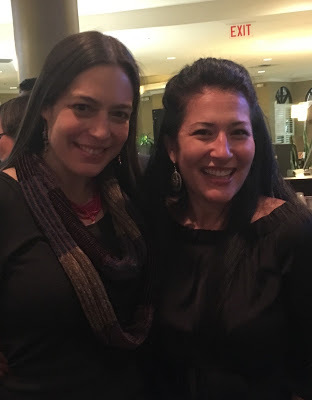
Since Ada is someone who I got to know in part through this space--the blog scene, and the poets associated with it in the mid-2000s--it feels appropriate to share what I said. Plus, the art of the introduction is something that interest me; how do we weave in personal anecdote while making sure to provide the important tenets of biography? How do you prime the audience for what to hear (or not)?
In my MFA program, Richard McCann was (is) legendary for the quality of his introductions. The first thing the author usually said was, "Let's just stop there."

Here's what I said, minus a few ad-libs:
Those of you who have studied poetry with me know that I am a fierce defender of the distance between poet and speaker. So it’s mildly heretical that I’m about to talk about the author off the page, rather than on it. Indulge me.
Ada Limón and I were part of a cohort of poets who came up at about the same time in publishing our first books. Now, I say that word "cohort" with two asterisks. The first asterisk is that we were a cohort uniquely born of the internet era. Yes, we each had the communities created by school—which in her case, was a rock-star class of New York University MFA graduates. But in the larger sense, we were that first virtual community of poets who had a meaningful dialogue via comments left on each others’ blogs. We muddled our way through NaPoWriMo together. We cheered each other on when no one else was paying attention. The second asterisk is that Ada’s first book and her second book were simultaneous, thanks to having Jean Valentine select the manuscript Lucky Wreck for the 2005 Autumn House Poetry Prize, and then—literally, within months—winning the 2006 Pearl Poetry Prize with The Big Fake World. That never happens. She made it happen.
[Note that the audience jumped into spontaneous applause here! She had a lot of fans in the crowd, some of whom had only encountered her for the first time at the afternoon craft seminar.]
One of my first trips to New York City, in November 2007, was to read alongside Ada at Chelsea’s ACA Gallery for Big Game Books , a micro press Three years later, I crowded into NYU’s Lillian Vernon House to hear her read with Jason Schneiderman and Jen Knox. I’m pretty sure I told each poet that I was friends with one of the other poets, to hide that I was just a big huge fan and I didn’t really know a soul in the room. There, she electrified the crowd with these lines from the title poem of her third collection, Sharks in the Rivers, which plays with a speaker’s efforts to overcome phobia:
Through another doorway, I walk to the East River saying, Sharks are people too. Sharks are people too. Sharks are people too. I write all the things I need on the bottom of my tennis shoes. I say, Let’s walk together. The sun behind me is like a fire. Tiny flames in the river’s ripples. I say something to God, but he’s not a living thing, so I say it to the river, I say, I want to walk through this doorway But without all those ghosts on the edge, I want them to stay here. I want them to go on without me. I want them to burn in the water.
Since then we’ve done a conference together in Texas, a panel together in Massachusetts, had some frank talks about the publishing world, and grabbed that fast hug at countless AWP Conferences. I’ve watched her move to Kentucky and have a book named “Top Ten” by the New York Times. So when I say you’re in for a great reading, that’s based on a decade’s worth of witness. The downside of having an introducer who follows your work for a decade is that she can dig up old interview answers like this one, from The Scrambler circa 2007:
[Note that at this point Ada curled up in her chair like one of those roly-poly bugs.]
Question: Where do you see yourself in 10 years?
Answer: (and here, I’ll excerpt) In ten years I'll be living in my hometown of Sonoma, in a small house with a big garden….I'll probably be married or living with an aging rock star or some organic farmer who is single handedly trying to bring back the bee. I'll write more poetry, some fiction, an album, and a screenplay. I'll go to Salmon Creek and build bonfires. I'll be remembering everything in case anyone forgets.
I started off by giving myself permission to get away from the page, but now I return to it. What I appreciate about Ada Limón’s work is not pyrotechnics of form, but the ember of a closely held truth. Although I know that one of her formative mentors is Philip Levine, I actually think of another Philip, Philip Schultz, and his great big heart.
The poet and the speaker are not one and the same. But I suspect that the poems you’ll hear tonight—drawing on both Bright Dead Things, a 2015 finalist for both the National Book Award and the National Book Critics Circle Awards in Poetry, and her forthcoming collection The Carrying—will grapple with realities common to us all:
Like sharks, to survive we move forward to live. To move forward, we name goal-dreams and dream-goals. To move forward from there, we must admit: What was gained? What was lost? How is that loss manifested in the natural world? How do we make good of mourning? How do we reconcile our past and future selves? We embrace being present. Yet we dream again. We dream big. Without further ado, and with much pleasure, I present Ada Limón.
#
I played only a minor role, of course. What followed--six poems from the most recent book, six poems from the forthcoming one, a few jokes, and great prefacing comments that invited the audience to engage with the work--that's where the magic happened. But I'm so glad I could help set the stage for Ada.
One of my former students, who first encountered "How to Triumph Like a Girl" in our residency workshop a year ago, was in tears of happiness. Once can get complacent about the value of readings, fifteen years into a career. Then I'm reminded that they can be revelational, revolutionary spaces. They can touch people.
The bookstore staff sold out of copies of her book within minutes.
Safe travels, lady! See you next time. One of my favorite things about this life, stressful as it may be, is that there is always a next time.

Published on January 07, 2018 05:40
January 4, 2018
2018 Poet Bloggers ~ The Revival Tour!

A bunch of folks, including some of whom I've tracked closely in the last fifteen years of our writing lives, decided to reinvigorate their blogs for the new year. I'm really excited about this, because--even in a world rife with social media and sharing, with Facebook and Twitter and Instagram and Tumblr--this space seems to bring out a different kind of thought-process, particularly among poets. I'm in. Chicks still dig poetry.
Below is the list of bloggers who are part of the Revival Tour. If you're a poet with a blog, please join us by leaving a comment over at the blog of Donna Vorreyer .
Ringleaders of This New Year’s Resolution:
Kelli Russell Agodon http://ofkells.blogspot.com/ Donna Vorreyer https://djvorreyer.wordpress.com
Bloggers to Follow* on the Revival Tour:
Beth Adams http://www.cassandrapages.comTeresa Hichens Ballard http://teballard.blogspot.com/Sandra Beasley http://sbeasley.blogspot.comCarolee Bennett https://gooduniversenextdoor.com/Mary Biddinger wordcage.blogspot.com/ Andrea Blythe http://www.andreablythe.comDave Bonta http://vianegativa.usJim Brock http://picturesthatgotsmall.blogspot.com James Brush http://coyotemercury.comAngela T Carr https://angelatcarr.wordpress.com/Patricia Caspers http://www.patriciacaspers.com/I. F. Caton http://analogverse.blogspot.com/Grant Clauser http://www.uniambic.comKevin Connor https://ordinaryaveragethoughts.wordpress.com/Jared Conti http://www.theoracularbeard.com Josephine Corcoran http://www.josephinecorcoran.orgJill Crammond https://jillypoet.wordpress.com/ Jenelle D’Alessandro http://www.borderandgreetme.comLaura E. Davis http://www.dearouterspace.com/Kate Debolt http://www.katedebolt.net/blog/Heather Derr-Smith ferhext.com/ Risa Denenberg https://risadenenberg.weebly.com/blogAmy Dryansky https://amydryansky.comCynthia Schwartzberg Edlow http://cschwartzbergedlow.blogspot.comAndrew Eickstead http://www.unleashingthewordhoard.com Lou Faber https://anoldwriter.comJeannine Hall Gailey webbish6.com Gail Goepfert gailgoepfert.comErica Goss http://ericagoss.comUma Gowrishankar https://umagowrishankar.wordpress.com/Sarah Kain Gutowski mimsyandoutgrabe.blogspot.comCharlotte Hamrick zouxzoux.wordpress.comErin Hollowell beingpoetry.netTrish Hopkinson https://trishhopkinson.com/Jennifer Hudgens https://jenniferelhudgens.wordpress.comCatherine Hume https://catherinehume.wordpress.com/Crystal Ignatowski http://somehiatus.tumblr.com/MJ Iuppa http://mjiuppa.blogspot.com/Charles Jensen https://charles-jensen.com/kinemapoetics-blog/JJS https://thisembodiedcondition.wordpress.comJill McCabe Johnson http://jillmccabejohnson.com/blog-chanson-daventure.htmlCollin Kelley http://www.collinkelley.blogspot.comKathleen Kirk https://kathleenkirkpoetry.blogspot.com/Anita Olivia Koester https://www.forkandpage.com/Lakshmi thiswinterheart.tumblr.comCourtney LeBlanc wordperv.com Lorena P Matejowsky https://nothingbutblueskies.wordpress.com/ Marilyn McCabe OWrite.MarilynonaRoll.wordpress.comAnn Michael www.annemichael.wordpress.comAmy Miller http://writers-island.blogspot.com/James Moore jameswmoore.wordpress.com LouAnn Sheperd Muhm https://louannmuhm.com/January Gill O’Neill http://poetmom.blogspot.com Shawnte Orion http://batteredhive.blogspot.com/Ren Powell https://renpowell.com/category/poetry/Bethany Reid http://www.bethanyareid.com/ Susan Rich http://thealchemistskitchen.blogspot.com Lee Ann Roripaugh https://runningbrush.wordpress.com/Sarah Russell https://sarahrussellpoetry.netJennifer Saunders http://www.magpiedays.comCarl Setzer https://questionsall.netMartha Silano http://bluepositive.blogspot.com/Kim Bailey Spradlin www.kimbaileydeal.netBonnie Staiger https://bonniestaiger.com/Rosemary Starace https://thresholdview.wordpress.com/Hannah Stephenson http://thestorialist.comStephanie Lane Sutton athenasleepsin.wordpress.comChristine Swint https://balancedonedge.blog/ Carey Taylor https://careyleetaylor.comDylan Tweney http://dylan20.tumblr.com/Michael Allyn Wells http://stickpoetsuperhero.blogspot.com/Lesley Wheeler Lesleywheeler.orgAllyson Whipple http://allysonmwhipple.comSean Wright https://sbwrightpoet.blogspot.com.au/*This list is current as of January 3, 2018; I'll be updating my blogroll, as well.
Published on January 04, 2018 07:44
December 9, 2017
Your Community Recognizes [X] Is an Abuser, a Harasser, or Otherwise Compromised. So...What Now?
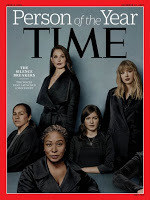 The Time magazine cover honoring "The Silence Breakers" is a good thing, though it would be a great thing if Tarana Burke was pictured.
The Time magazine cover honoring "The Silence Breakers" is a good thing, though it would be a great thing if Tarana Burke was pictured.Anonymous contributors are crowdsourcing experiences of "sexual harassment in the academy" (across multiple disciplines of study) on a site hosted by Karen Kelsky of "The Professor is In."
People are opening up about experiencing harassment, abuse, or other inappropriate boundary-crossing from people--sometimes powerful, beloved, or both--within their shared communities. In many cases, these experiences had already been expressed, then didn't receive the traction they should have. But some people (not all, but some) are doing a better job of listening now.
All of this is easy to applaud in the abstract. Then the day comes when this happens in your own community. Now what?
I'm not talking about existing infrastructures for formal response, such as filing Title IX complaints or forcible removals from appointed positions. I'm talking about the larger body of actions we can take, as a community of artists or scholars, to ensure that a vulnerable party feels welcome. A few thoughts based on what I've observed:
-There's a lot of white, heterosexual men of mediocre talent who abuse, harass, or cross boundaries. The dominant power structure has protected them for some time. Unfortunately, you know who else is capable of bad decisions? Women. Writers of color. Gay people. People who are, themselves, survivors of religious or political persecution. People with disability. [X] may be part of a marginalized community too. Resist responding with exaggerated grief at "our loss." Do not imply a victim's decision to come forward is at the cost of a community's diversity or inclusivity (which, to be clear, is offensive on multiple levels).
- Do not let someone's interaction with [X] define their time in your community. People suppresses complaints because no one wants be known as the "the one who...." The victimhood narrative can be like kudzu, obscuring everything else someone has accomplished. Always pair "we will address your concerns" or "I'm so glad you spoke up" with "now, how can we help promote into the world the talents that brought you to us?" Make it a point, when you cross paths down the road, to cite a shared experience that has nothing to do with [X].
-Sustained harassment or abuse often coincides with working closely together, which may be to the exclusion of other mentorship. When the relationship with [X] is severed, so is access to a reference that could speak in great depth to the vulnerable party's work in this period. Foster supplemental dialogue with someone of comparable stature, who can be relied on to provide a compelling reference going forward. Realize that without access to such letters, many hit a dead end in applying for competitive opportunities.
This list of ideas will grow. I know there's more that we can do. And if you're reading this because you share a community with me personally, and there is something you need help with--professional support or a sympathetic ear--please let me know.
Published on December 09, 2017 10:40
November 25, 2017
How Much to Reveal or How to Reveal It
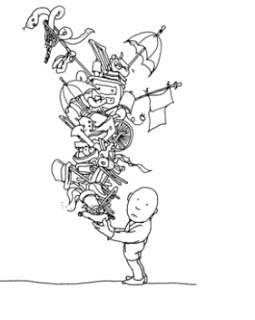 Lots going on in these past few months--including a fun conference about food writing in Tampa where I read new poems. I wrote some new poems, too. New poems! I put in final edits on an anthology I've edited, which will be out next year with a university press. Then a trip to Cyprus for an international poetry conference that I'm writing about for a magazine (fingers crossed), which means I can't write about it here. Yet.
Lots going on in these past few months--including a fun conference about food writing in Tampa where I read new poems. I wrote some new poems, too. New poems! I put in final edits on an anthology I've edited, which will be out next year with a university press. Then a trip to Cyprus for an international poetry conference that I'm writing about for a magazine (fingers crossed), which means I can't write about it here. Yet. Before I go even one step further, I want to share this from Meg Day, a fantastic poet I got to read with back in April 2015 at the University of South Florida, and who I've been thrilled to call a friend ever since. I'm really excited to share the news that we'll be part of a Split This Rock panel together at the festival in April 2018. Day did a quick interview with 24 Pearl Street for their blog, and this is something she had to say:
MH: In your NEA interview, you mention how ASL is often misunderstood and diminished as a language of charades and how hearing people watching ASL poetry can further enforce that stereotype. I minored in Hearing and Deafness studies so I’m familiar with this issue. Do you think it’s a matter of needing more interpreters or featuring more ASL poetry in the “literary world” or encouraging ASL as a more common second language?
MD: You mention more interpreters & featuring more ASL poetry in the literary world & encouraging ASL as a more common second language. I say YES-YES to all of this, though let’s make sure we get it right: there are plenty of interpreters, d/Deaf poetry is everywhere in the literary world, & ASL is already the fourth most common language in this country. We don’t need more terps, we need more access to terps & more sociocultural fluency around terps. We don’t need more ASL poetry (this is a lie; please, please more ASL poetry), we need editors who will publish it & do so with the understanding that this is a part of our American literary heritage & our contemporary poetics. In the midst of this Dis/Deaf Uprising—& a really gorgeous boom of dis poetics & dis activism—we’re encountering editors who either want to get crip credit for publishing ableist & audist poems that seek to (ab)use the disabled experience, or editors who want to tokenize & segregate Deaf & disabled poets in special issues. Both are really offensive & foolish ways to front investment in sustainable inclusion, or a comprehensive understanding of American poetics, or even an interest in the inevitable insult of archive. I think if editors got their acts together & the nondisabled poets who are offered stage time at big conference & festival readings insisted, at least, on accessibility—if not the actual inclusion of a disabled poet on the bill—we’d be well on our way to having more interesting & powerful conversations.
# Read the whole interview here #
Q&As are a funny currency in the literary world: so often there's a lack of return on investment, but then occasionally you get something great. A writer-friend connected a number of her writer-friends with her graduate student, to answer questions relevant to an MFA thesis project. I appreciated what her thoughtful questions stirred up. Specifically....
On how much to reveal:
I don’t know how much to reveal, or how to reveal it. That’s a lifelong project for any author.
What’s funny is that when I read through my body of published writing—poems, freelance essays, memoir—I’m sometimes completely shocked at the naked details of life experience, or of my personal attitudes, that I’ve let float to the surface of a narrative. Sometimes there’s not enough context for anyone but me to recognize the reference, so I suppose that’s a kind of protective instinct. Other times I see how I’ve packaged a real-life anecdote and I’m overwhelmed by how much “more” there was to the actual event as I experienced it. But you don’t need to tell all of the story all of the time. Sometimes restraint is a good idea for the sake of your sanity, relations with friends and family, and the attention of your reader.
There are essays I’m working on right now that might be something I can’t publish in the foreseeable future, because they trespass into the lives of others too much. But it would be a mistake to not write them for that reason. I’ve got to do the writing first, then decide. That’s endlessly frustrating to someone who is a perfectionist (as I am) and who works best toward external deadlines (as I do), but so be it.
On the effects of social media on the dynamic of reader and writer:
The great news is, Writers are real people! They have pets, and meals, and minor shopping frustrations, and major worries about the state of the world. Social media, depending on how they choose to use it, makes all of these nuances of character available to you as their reader.
The terrible news is, Writers are real people! They have petty disagreements, their food photographs are poorly lit and unappetizing, their childhood friends have extreme political views, and they sometimes quote student mistakes in a way that they probably feel is “healthy venting” but to me is just inexcusable.
There’s a few dozen American emerging poets who all had blogs around the same time, mid-2000s, and we used that space to post substantive mini-essays about our lives and our thoughts on the publishing industry. The comments sections were hopping and largely respectful. I miss those dialogues. More importantly, I miss the way that reading those blogs was integrated with my exposure to the actual poems, since many of us were simultaneously page-neighbors in magazines and journals.
If you are a reader of someone’s social media only—and I think more of us are in that position than we’d like to admit—do you count yourself as a “reader” of their work?
On identifying as a writer, and the "risk" of vulnerability:
I identify as a poet first, then as a nonfiction writer. Being a poet makes me a better nonfiction writer because I’m trained to recognize or apply framing conceits—ways of looking at things metaphorically—and because I’m particularly open to unconventional structure. Sometimes I’m drawn to explicit narratives, other times to subtle “landscapes” of text; I believe in the power of juxtaposition as well as argument.
A writer doesn’t exist in a vacuum of aesthetics. I’m also a mix of inheritances that add up to being American, white, middle-class, and somewhat Southern. Fortunately, I was exposed to teachers who challenged me to read well beyond works by those who mirror me culturally. I am allied with those who have disability, in part because of my food allergies (multiple and life-threatening) and in part because every caring human should be allied with those who have disability. I’m frustrated that group, even specific to the literary world, is frequently left out of otherwise progressive advocacy conversations.
You can’t be vulnerable without taking a risk. I’m not saying that to mock the question, but it’s really hard for me to envision being a poet or memoirist and not being vulnerable, and I’ve never been in denial of the risk associated with that, Maybe there are fiction writers who can feel differently? I’ve always wondered what that might be like, to build a world on the page. Anyway, the risk is worth the reward. I love every aspect of writing and publication: drafting, revision, submission, editorial correspondence, traveling for readings, even the dreaded “marketing.” I really do love the whole process, even when I’m complaining at 2 AM.
On confidence and gender politics in writing:
Usually, rational confidence is grounded in the surety that you’re presenting information that is both correct and shaped well. Extra confidence—what we’d call charisma or bravado—is grounded in the knowledge that when you’re presenting is particularly insightful or novel. I’d resist gendering any of these criteria. I take pride in the fact that I’m not afraid to stake truth claims in my work.
That said, I’ve always been a confident speaker. I played P.T. Barnum in the elementary school play one year, and then I was cast as Shakespeare’s Puck the next year. So does varying confidence affect my writing? Not so much. But I can set aside my particular instincts and sympathize with someone who has had a different base of experience, one which causes them inhibition or insecurity on the page. I’ve found that important to being a good teacher, because I’ve encountered amazing students who just needed help presenting their ideas with confidence.
On being a feminist:
Like a lot of American women of my generation, I had a long period in my youth when I took for granted the accomplishments of feminism. Sure, I noticed the ways in which “girl” and “boy” modes were differentiated and reinforced along stereotypical tracks (I was steered toward pink, versus blue; encouraged to play “nurse,” as opposed to “doctor"). But no one ever tried to restrict my movements, education, or creative output based on my gender. Birth control was an option. Abortion was an option. Hell, I could vote—I could open up a line of credit—I had no idea how relatively “new” these opportunities were.
I wanted to be evaluated strictly in terms of merit, and so I resisted affiliating as a feminist or even simply as a “woman” writer, fearing those labels would somehow compromise the measure of my worth. I thought that to be taken seriously by the powers that be, which I now realize I’d equated implicitly to male powers, I’d have to suppress my identity as a woman. I’m not proud of my earlier solipsism; I just acknowledge it to provide contrast and perspective. I was also willfully ignoring some pretty crass and sexist behaviors coming my way, which at the time I thought showed my grit.
I became a feminist when I recognized that my determination to “make it on my own” was a fallacy that ignored what those before me had sacrificed. I became a feminist because I started to see women I cared for slip through the cracks, failing to receive the support and nurturing they needed to succeed in art or academia or business, simultaneous to the pressure they felt to be caregivers. I became a feminist because I realized that the ways in which I diverged from what I thought of as “typical” feminist rhetoric or life experience made me more useful to the conversation, not less.
How does this manifest? I hope in taking the time to help and mentor women in particular (and I use “women” here in an inclusive, non-binary sense; anyone who self-identifies that way), often in the form of gently pushing women to not internalize minor failures as global rejections or signs that they’re not "meant" to do something. I try to both listen for and correct, in real time, gendered assumptions in speech by myself and those around me. I read work by women, I teach their work to others, and I foreground them when asked to curate something. We set the examples for the next generation. If that means the students of tomorrow take it for granted that a syllabus features at least 50% literary works by women, then I’ve done my job.
On the lure of the personal and "intellectual" vs. "emotional" writing:
Writing the personal is a natural extension of my entry into writing through poetry, which is so often driven by the intimate impulse; we get the term “lyric,” in part, from that centering on the I / eye. Illustrating experience is what makes reading powerful, so I’m not looking to separate the emotional from the intellectual. (An economist or sociologist might disagree with me; I admit that there are a few realms where the personal story can be misleading, but I’m speaking primarily about creative writing.)
What I’ll say, from a craft perspective, is that I admire personal writing that incorporates outside research from science and history. The essay collections and memoirs I love best interweave cultural history. Eula Biss, Margo Jefferson, Carmen Maria Machado, and Elena Passarello are all particularly good at this. Readers enjoy feeling like the journey is one of learning as well as understanding. Or at least, I do.
Published on November 25, 2017 02:24
September 12, 2017
Dear IOTA Club and Cafe~

Dear IOTA, I know exactly how to get to you--Route 50 to 10th, then the sneaky cut across Danville Street.
Dear IOTA, I've spent a lot of time balanced on the black-cushioned barstool, scribbling, over a concrete floor layered in slate blue and flecks of goldenrod.
Dear IOTA, you were the only place I ordered Samuel Smith's Nut Brown Ale.
Dear IOTA, a petite woman with red hair used to recite brief, rhymed poems in a thick Irish brogue to close every Sunday Poetry Series. I can't remember her name, but I can picture her face.
Dear IOTA, you're where I got to know the glory of Fatslug.
Dear IOTA, your cover charge was always on point, never too much.
Dear IOTA, in 2005, I could figure out someone pretty fast by asking their favorite spot on Wilson: IOTA, Galaxy Hut, or Whitlow's.
Dear IOTA, that Erin McKeown show was amazing.
Dear IOTA, I remember when your two halves were separated by the round bar, and sometimes it got weirdly complicated to meet up with a friend.
Dear IOTA, I had a crush on one of your bartenders and used to bring my MFA homework around on slow nights to keep him company.
Dear IOTA, he played guitar at the Wednesday Open Mic and that cured my crush.
Dear IOTA, you know how to cook a salmon fillet.
Dear IOTA, the clip-on light for your music stand is absurdly bright.
Dear IOTA, my family got used to spending Mother's Day with you, because Miles kept putting me on the May reading schedule.
Dear IOTA, I must have had a dozen conversations with Steve, and he was always too modest to mention he was the co-owner.
Dear IOTA, glass blocks will never go out of style, nor hippie paintings on brick of a smiling sun, leaping fish, and flowering vine.
Dear IOTA, you used the visible I-bar along the ceiling to store CDs: brilliant.
Dear IOTA, when the mailman came to the door at night--he got the apartment number off my mail--to invite me out for a "date," I still dared step outside a half-hour later. Because I was heading to IOTA and I wasn't going to miss it for that creep.
Dear IOTA, that Rose Polenzani show was amazing.
Dear IOTA, there's never a more sensible place to store extra chairs than in the eaves over the exit.
Dear IOTA, may your soundboard be ever protected by concrete blocks painted black.
Dear IOTA, I was little thrown off the first year you draped Christmas lights all above the stage, but they've grown on me.
Dear IOTA, no book I wrote was real until I read from it on your stage.
Dear IOTA, I remember when you served your french fries on oval plates piled absurdly high, each plank the full length of a potato.
Dear IOTA, for a time you made the terrible decision to serve french fries in mugs.
Dear IOTA, the batter was still crisp, the pepper sharp. You make the best french fries in the world.
Dear IOTA, Clarendon developers will spend hundred of thousands of dollars trying to recreate the very thing that they crowded out.
Dear IOTA, your name is about to become a shibboleth.
Dear IOTA, on Sunday someone got up and read a poem for Charlottesville, and then another person, because you're where we take the drafts trying make sense of things.
Dear IOTA, you're the only place my voice still shakes as I step up to the mic.
~September 10, 2017
#
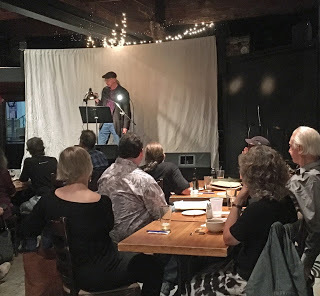
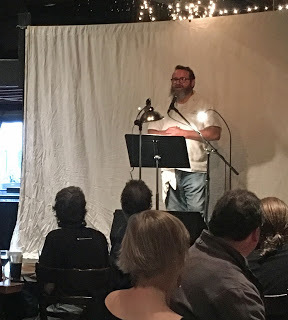
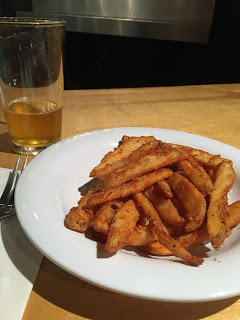
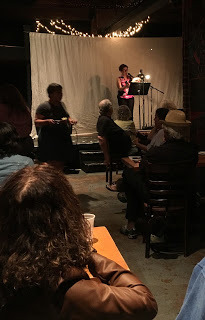
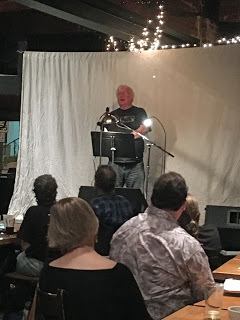
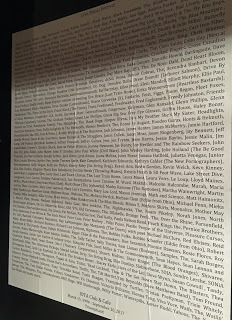
#
https://www.arlnow.com/2017/02/15/iota-club-building-to-be-demolished-under-market-common-clarendon-redevelopment-proposal/
https://www.arlnow.com/2017/09/08/breaking-iota-club-closing-this-month/
Published on September 12, 2017 10:54
September 8, 2017
Small Pleasures: Paprika Edition
Sometimes I use this blog for serious things. Sometimes I don't.
& with that in mind, here's my latest experiment in cooking....

PAPRIKA ROASTED POTATO SALAD
Ingredients
Potatoes (small bag, Yukon golds, skin-on)Chickpeas (1 can)Onion (1 small onion, yellow or white)Garlic (1 head, whole cloves)Jalapeños (2, thin-sliced, minimal seeds)
Capers (~3 tablespoons)Kalamata Olives (~20 sliced)Anchovies (~8 chopped)*Fresh tomatoes (~1/2 cup, diced)Lemon (1 whole lemon, juiced)Parsley (1/2 bunch, Italian flat-leaf)
Salt PepperPaprika (regular, smoked, hot; your choice)Olive oilVinegar (sherry, balsamic, port; your choice)
*Optional, for vegetarians
Instructions
Preheat oven to 400 degrees.
Cover two baking trays in aluminum foil.
Use a large mixing bowl to combine potatoes (quartered), chickpeas (drained and rinsed), onion (chopped), and garlic (whole cloves).
Lightly coat all with olive oil, salt, and paprika.
Spread onto baking sheets in a single layer. Set timer for ~15 minutes.
Cut and combine olives, anchovies, tomatoes; add capers and lemon juice.
At 15-minute mark, turn potatoes and chickpeas and stir in olive-caper mixture, conserving any leftover "juice." Set timer for ~10 minutes.
Rinse, dry, and chop parsley.
At timer's ring (total cook time ~40 minutes), remove baking sheets from the oven. Add finishing twists of pepper and a sprinkle of parsley over all; I also added some Hungarian (hot) paprika. Add a bit of vinegar to the "juice" to make a dressing.
This dish works hot, room temperature, or cold.
*.I cook to soothe my nerves.
Oh, yes: and I'm interviewing Karl Ove Knausgaard in exactly one week.
& with that in mind, here's my latest experiment in cooking....

PAPRIKA ROASTED POTATO SALAD
Ingredients
Potatoes (small bag, Yukon golds, skin-on)Chickpeas (1 can)Onion (1 small onion, yellow or white)Garlic (1 head, whole cloves)Jalapeños (2, thin-sliced, minimal seeds)
Capers (~3 tablespoons)Kalamata Olives (~20 sliced)Anchovies (~8 chopped)*Fresh tomatoes (~1/2 cup, diced)Lemon (1 whole lemon, juiced)Parsley (1/2 bunch, Italian flat-leaf)
Salt PepperPaprika (regular, smoked, hot; your choice)Olive oilVinegar (sherry, balsamic, port; your choice)
*Optional, for vegetarians
Instructions
Preheat oven to 400 degrees.
Cover two baking trays in aluminum foil.
Use a large mixing bowl to combine potatoes (quartered), chickpeas (drained and rinsed), onion (chopped), and garlic (whole cloves).
Lightly coat all with olive oil, salt, and paprika.
Spread onto baking sheets in a single layer. Set timer for ~15 minutes.
Cut and combine olives, anchovies, tomatoes; add capers and lemon juice.
At 15-minute mark, turn potatoes and chickpeas and stir in olive-caper mixture, conserving any leftover "juice." Set timer for ~10 minutes.
Rinse, dry, and chop parsley.
At timer's ring (total cook time ~40 minutes), remove baking sheets from the oven. Add finishing twists of pepper and a sprinkle of parsley over all; I also added some Hungarian (hot) paprika. Add a bit of vinegar to the "juice" to make a dressing.
This dish works hot, room temperature, or cold.
*.I cook to soothe my nerves.
Oh, yes: and I'm interviewing Karl Ove Knausgaard in exactly one week.
Published on September 08, 2017 20:24




